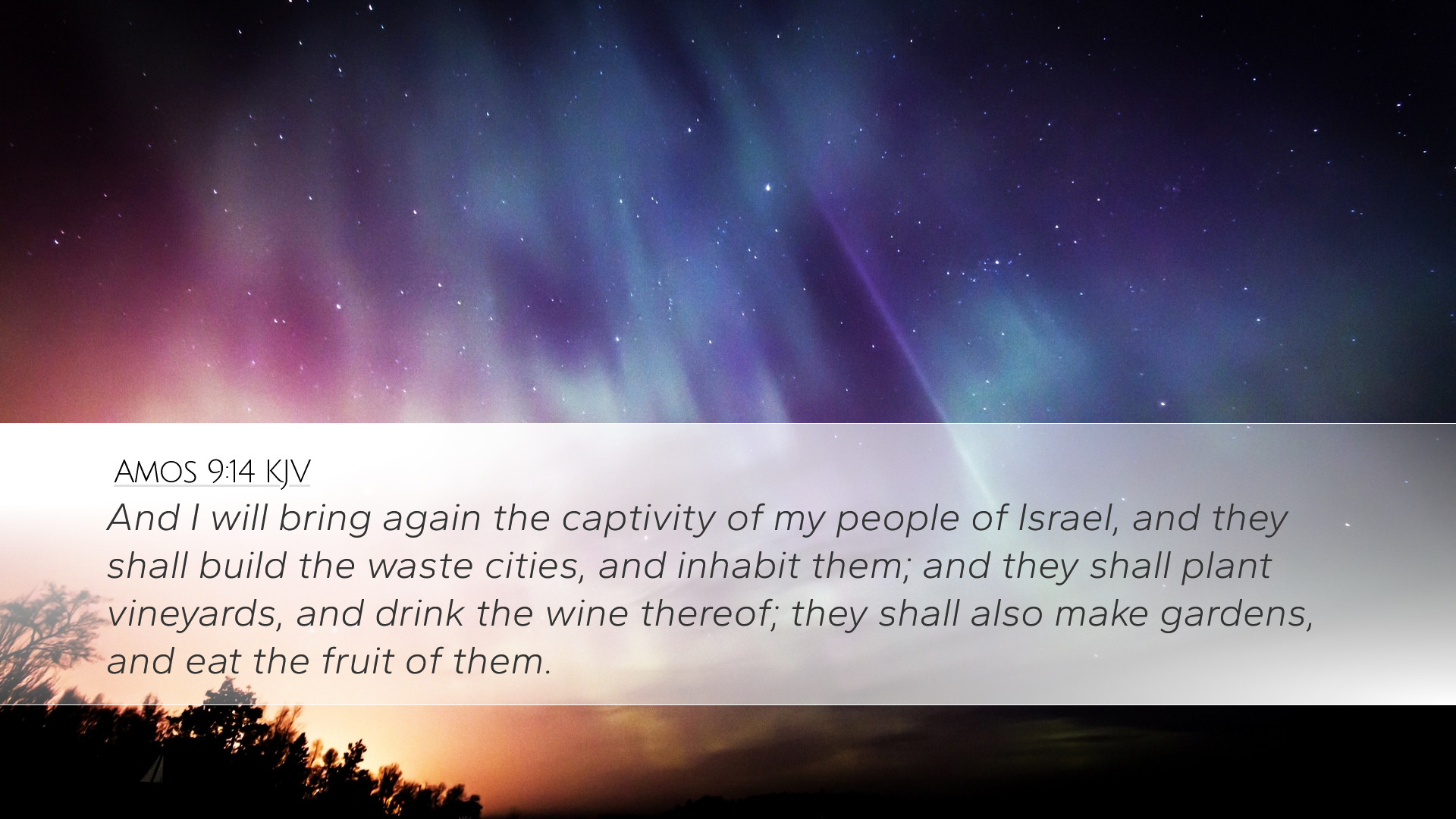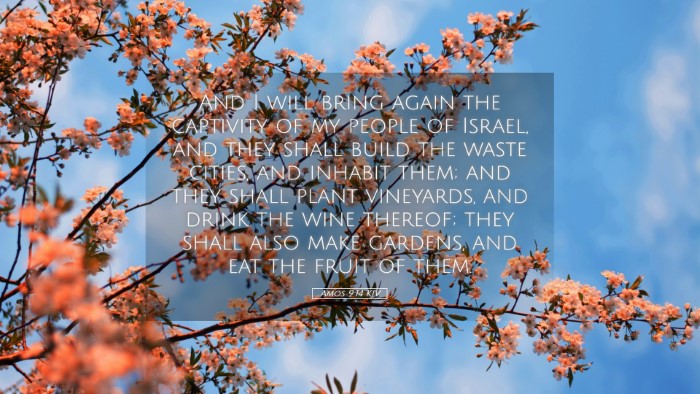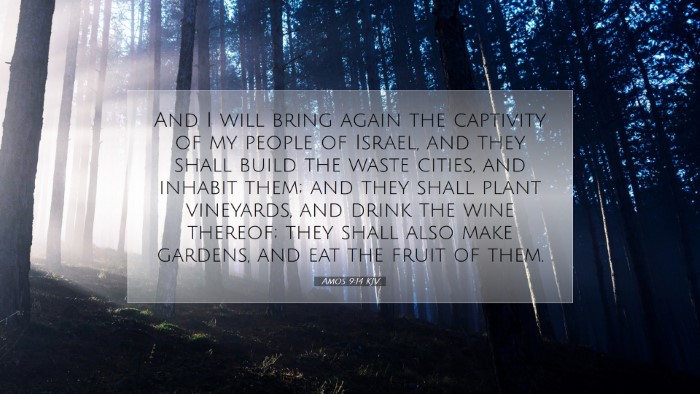Old Testament
Genesis Exodus Leviticus Numbers Deuteronomy Joshua Judges Ruth 1 Samuel 2 Samuel 1 Kings 2 Kings 1 Chronicles 2 Chronicles Ezra Nehemiah Esther Job Psalms Proverbs Ecclesiastes Song of Solomon Isaiah Jeremiah Lamentations Ezekiel Daniel Hosea Joel Amos Obadiah Jonah Micah Nahum Habakkuk Zephaniah Haggai Zechariah MalachiAmos 9:14
Amos 9:14 KJV
And I will bring again the captivity of my people of Israel, and they shall build the waste cities, and inhabit them; and they shall plant vineyards, and drink the wine thereof; they shall also make gardens, and eat the fruit of them.
Amos 9:14 Bible Commentary
Amos 9:14 Commentary
Amos 9:14 states: "And I will bring again the captivity of my people of Israel, and they shall build the waste cities, and inhabit them; and they shall plant vineyards, and drink the wine thereof; they shall also make gardens, and eat the fruit of them." This verse is rich with hope and restoration, illuminating God's promise to Israel after a period of judgment.
Overview
This passage serves as a profound message of the eventual restoration and reclamation of Israel. Through the lens of prophetic literature, it invokes themes of renewal, divine promise, and the communal flourishing of God's people. Commentators such as Matthew Henry, Albert Barnes, and Adam Clarke provide in-depth insights into this verse, making it significant for pastors, theologians, and scholars alike.
1. Contextual Analysis
In the larger context of the Book of Amos, the prophet Amos delivers messages of impending judgment on Israel due to their disobedience and social injustices. However, as the book concludes, the tone shifts dramatically to one of hope and restoration:
- Historical Background: Amos prophesied during a time of relative prosperity for Israel, yet he witnessed moral decay and idolatry among the people.
- Literary Structure: The prophecy captures a shift from impending doom to the promise of restoration, encapsulating the duality of God's justice and mercy.
2. Theological Implications
God's assurance to "bring again the captivity" underlines key theological themes:
- Divine Sovereignty: God's control over the fate of nations, emphasizing His ability to reverse misfortune.
- Restoration Theology: The centrality of restoration in biblical narrative, showcasing God's unwavering commitment to His covenant people.
- Hope Amidst Judgment: God's promise of bringing His people back signifies that even in times of judgment, hope remains for redemption.
3. Commentary Insights
Matthew Henry
Matthew Henry emphasizes the grace of God in restoring Israel. He highlights how the verse signifies a promise that they will not only return but thrive: "They shall build the waste cities." This notion of rebuilding resonates deeply, suggesting that what was once desolate will be revitalized through God's intervention.
Albert Barnes
Albert Barnes reflects on the agricultural imagery present in the passage. He notes that "they shall plant vineyards and drink the wine thereof" illustrates the abundance and joy that God intends for His people. Barnes argues that the mention of vineyards and gardens symbolizes not just physical provision, but spiritual rejuvenation, as Israel returns to worship and covenant faithfulness.
Adam Clarke
Adam Clarke expands on the communal aspect of restoration in his analysis. He posits that the restored state of Israel is not merely individualistic; rather, it emphasizes community and collective identity, stating that the people will "eat the fruit" of their labor, signifying shared blessings. Clarke's insights highlight the interconnectedness of God's people in experiencing and celebrating divine providence.
4. Practical Applications
The themes presented in Amos 9:14 present numerous practical applications for today’s audience:
- Encouragement in Adversity: For individuals facing personal or communal hardship, this verse serves as a reminder of God's promise to restore and revitalize.
- Community Engagement: Churches and faith communities can take inspiration from the exhortation to rebuild and cultivate together, fostering environments of growth and mutual care.
- Stewardship of Creation: The emphasis on planting and enjoying the fruits of labor invites believers to engage in stewardship, recognizing the divine provision in their lives and the importance of sustainable practices.
5. Conclusion
Amos 9:14 stands as a beacon of hope within a prophetic book that is often characterized by messages of judgment. By bringing together insights from various commentators, we glean a rich tapestry of understanding regarding God's nature as a restorer and a promise-keeper. This verse offers profound encouragement to all believers about the possibilities of renewal—spiritually, physically, and communally.


